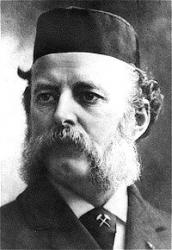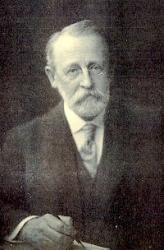Planning worship?
Check out our sister site, ZeteoSearch.org,
for 20+ additional resources related to your search.
- |
User Links
Person Results
Rossiter W. Raymond

1840 - 1918 Author of "Now Rest, Ye Pilgrim Host" in The Cyber Hymnal Raymond, Rossiter Worthington, PH.D., was b. in Cincinnati, Ohio, April 27,1840. He graduated at Brooklyn Polytechnic, 1858, and also studied in Germany. He served in the Civil War of 1861-4 with the grade of Captain. Since then he has practised in New York as a consulting mining engineer. He was editor of the American Journal of Mining, and is a contributor to scientific literature. He has also written stories for children, a Paraphrase of Job, and some fugitive poetry. His hymns in common use include:—
1. Far out on the desolate billow. [God everywhere.] Written for the German tune, "Ich weiss nicht was soil es bedeuten," and published in The Plymouth Hymnal, 1894.
2. Morning red, Morning red. [Easter.] Written to the tune" Morgenroth," a German battle-song, and published in the American Book of Praise.
3. Now rest, ye pilgrim host. [Reviewing the Past.] This hymn is dated 1879, and was written for the 50th anniversary oi the Brooklyn Sunday School Union. It was included in The Plymouth Hymnal, 1891, No. 509, and, after revision by the author, in Sursum Corda, 1898, and other collections.
4. 0 Thou Who art inspiring. [Submission.] Appeared in The Plymouth Hymnal, 1894, No. 635, and later in other collections.
5. The God Who spann'd the heavens above. [Courage in Conflict.] "Written for my Sunday School, to be sung to the tune of the German patriotic song, ‘Der Gott, der Eisen wachsen liess' (by Arndt, p, 79, ii.), of which my first line is an evident and intentional imitation, though the remainder is not" (Author's MS.). It was published in The Book of Praise, the Sursum Corda, 1898, and others. It is sometimes attributed to "J. Clark,” but in error.
6. There dwelt in old Judaea. In Allon's Children's Worship, 1878.
Of the above Nos. 1, 2, 5 are in W. B. Bradbury's Clarion, 1867. Dr. Raymond is a Congregationalist, and is associated with the Plymouth Church, Brooklyn. [Rev. L. F. Benson, D.D.]
--John Julian, Dictionary of Hymnology, New Supplement (1907)
Rossiter W. Raymond
William Wallace Gilchrist

1846 - 1916 Composer of "THE PILGRIM HOST" in The Cyber Hymnal Born: January 8, 1846, Jersey City, New Jersey.
Died: December 20, 1916, Easton, Pennsylvania.
Buried: Saint Thomas’ Episcopal Church, Fort Washington, Pennsylvania.
Gilchrist’s family moved to Philadelphia, Pennsylvania, when William was nine years old. He attended school there until the outbreak of the American civil war, when his father’s business failed and William had to seek other work. Having a good voice, he sang in choirs and choruses, first as a soprano, and later a smooth, flexible baritone. He began singing some of the principal parts in the Handel and Haydn Society, where his first real musical life began.
At age 19, Gilchrist began studying organ and voice with Professor H. A. Clarke, gradually concentrating on theory. At age 25, he spent a year in Cincinnati, Ohio, as organist and teacher, returning to Philadelphia to take post of choir master at St. Clement’s Protestant Episcopal Church. He later became conductor of the Mendelssohn Club, Tuesday Club of Wilmington, and Philadelphia Symphony Society.
Gilchrist was best known as a composer. His first success was in 1878, winning two prizes from the Abt Society of Philadelphia for best choruses for male voices. In 1881, he won three similar prizes from the Mendelssohn Glee Club of New York. In 1884, he took a $1,000 prize from the Cincinnati Festival Association; the judges included Saint-Saëns, Reinecke, and Theodore Thomas. This work was an elaborate setting of the Forty-Sixth Psalm, and was enthusiastically received. Gilchrist afterwards modified it and brought it out at the Philadelphia Festival in 1885.
Gilchrist also served as editor of the 1895 Presbyterian hymnal, as musical editor of The Magnificat in 1910, and wrote symphonies, chamber and choral music. His works include:
An Easter Idyll
Psalm 46 (New York: 1882)
One Hundred and Third Psalm
Ninetieth Psalm
Fifth Psalm
Prayer and Praise
De Profundis
The Rose (New York: 1887)
Ode to the Sun
A Christmas Idyll (Boston, Massachusetts: 1898)
The Lamb of God (New York: 1909)
© The Cyber Hymnal™ (hymntime.com/tch)
William Wallace Gilchrist


 My Starred Hymns
My Starred Hymns

